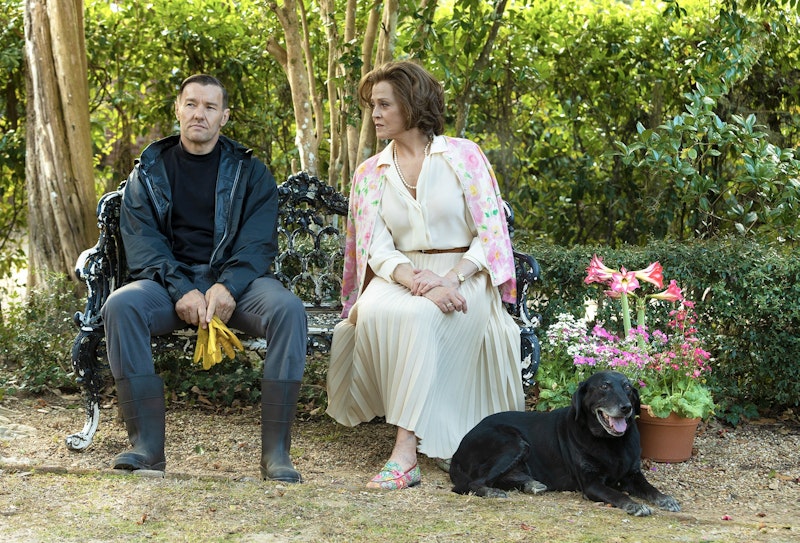Five years, three films, all interrupted: Paul Schrader’s First Reformed was an “instant” classic, but it premiered at Venice in August 2017, and most of the world had to wait until the summer of 2018 to see Ethan Hawke going from Calvinist preacher to suicide bomber. The Canyons may have gotten attention in 2013, but it was mostly negative and unrelated to the film (jokes about using Kickstarter to finance the film; jokes about star Lindsay Lohan; jokes about porn star James Deen; jokes about screenwriter Bret Easton Ellis; Razzies for just about everyone). First Reformed was Schrader’s best film in at least 20 years, and when it finally reached hundreds and hundreds of theaters, the message was clear: he still has masterpieces in him.
Schrader’s recent three film-run is the best argument against Quentin Tarantino’s assertion that all directors get worse with age and hit the wall hard in their early-60s. There are plenty of examples in both directions, but you have to remember that First Reformed premiered 41 years after Taxi Driver, his real breakthrough as a screenwriter. The Card Counter, another film delayed by a year due to the coronavirus pandemic, finally arrived 41 years after American Gigolo; although First Reformed is more fully realized, the highs of The Card Counter were thrilling—not just the incredible spider-eyed Guantanamo Bay flashbacks, but Oscar Isaac’s careful wrapping of furniture in white linens.
Master Gardener is a tepid slog compared to his previous two provocations. On paper, this sounds like the most transgressive of the three: Joel Edgerton plays a botanist working for an old money dowager played by Sigourney Weaver. Her grand-niece has been orphaned and is sent to the gardens to be an apprentice. Edgerton is hesitant, especially when Weaver tells him that she’s “mixed blood.” Shortly after, the first of a few sparse flashbacks begin—no fancy camera tricks, just wide shots of white supremacists and neo-Nazis. Like so many of Schrader’s solitary male ticking time bombs, Edgerton is isolating and punishing himself for his past: although he flipped for immunity and freedom and witness protection, he still hasn’t gotten rid of the dozens of incriminating racist tattoos all over his body.
Weaver doesn’t mind, apparently: they have a bit of a May-December thing going on, but more Norma Desmond, with the ritualistic domination of Edgerton merely through making him show her his back, covered in swastikas and “SS” logos and even more repulsive and obscure racist bile. There isn’t much to do on the gardens, I guess. When Quintessa Swindell, the grand-niece, appears, Edgerton is hesitant but falls for her. Weaver sees him running out of her cabin one night, right after he refused her advances and tried to pull up his shirt; she kicks both of them out and Swindell eventually sees Edgerton’s tattoos—he wanted her to.
And there’s violent retribution, but the stakes are so low compared to First Reformed (apocalyptic climate change) and The Card Counter (military torture), that when Edgerton merely smashes the knees of two penny-ante drug dealers hassling Swindell, you barely feel anything. Again, this was a movie Schrader promised “wouldn’t end up on Obama’s year-end list,” like First Reformed and The Card Counter. But aside from the former white supremacist angle—which is hardly explored or shown at all—Master Gardener is the most palatable and “mainstream” of the entire trilogy.
With each film, Schrader’s used a different aspect ratio: 1:37 Academy for First Reformed, the standard since the early sound era through the mid-1950s; 1:66 for The Card Counter, an intermediary ratio used in most of Europe; and finally 2:39 widescreen for Master Gardener, the least eventful and most visually dull of the trilogy. Schrader does so little with such an incendiary premise, and while I understand the desire to make generous, contemplative films in your twilight years (Clint Eastwood’s Cry Macho is the best recent example), Master Gardener splits itself down the middle, including too much case worker and white supremacist flashback teases and never really “delivering” on many of the things Edgerton did: executions, robberies and cookouts with fellow neo-Nazis.
His family and the beginning of his bigotry isn’t explored at all, and the film wouldn’t beg the question if it didn’t have so many brief flashbacks that end before they can really do anything, unlike the astonishing Guantanamo Bay sequences in The Card Counter. The script and the acting are also unbelievably stiff and stodgy, with so much dead dialogue slogging through a movie so devoid of color it’s easy to forget this guy’s passion is flowers. Master Gardener isn’t a bad film per se, but a significant decline from Schrader’s recent work, and the drop in quality is all the more noticeable since this is the end of a brilliant trilogy. Edgerton writes in a diary alone at night, but he doesn’t drink much and only allows himself one cigarette a day (two when he goes to an NA meeting). Unlike the previous two, Edgerton really does have a happy ending, reconciling with Swindell, alive and free. Once again, all of this sounds good on paper, but Schrader’s falter is unavoidable because he’s been so good recently.
—Follow Nicky Smith on Twitter: @nickyotissmith

